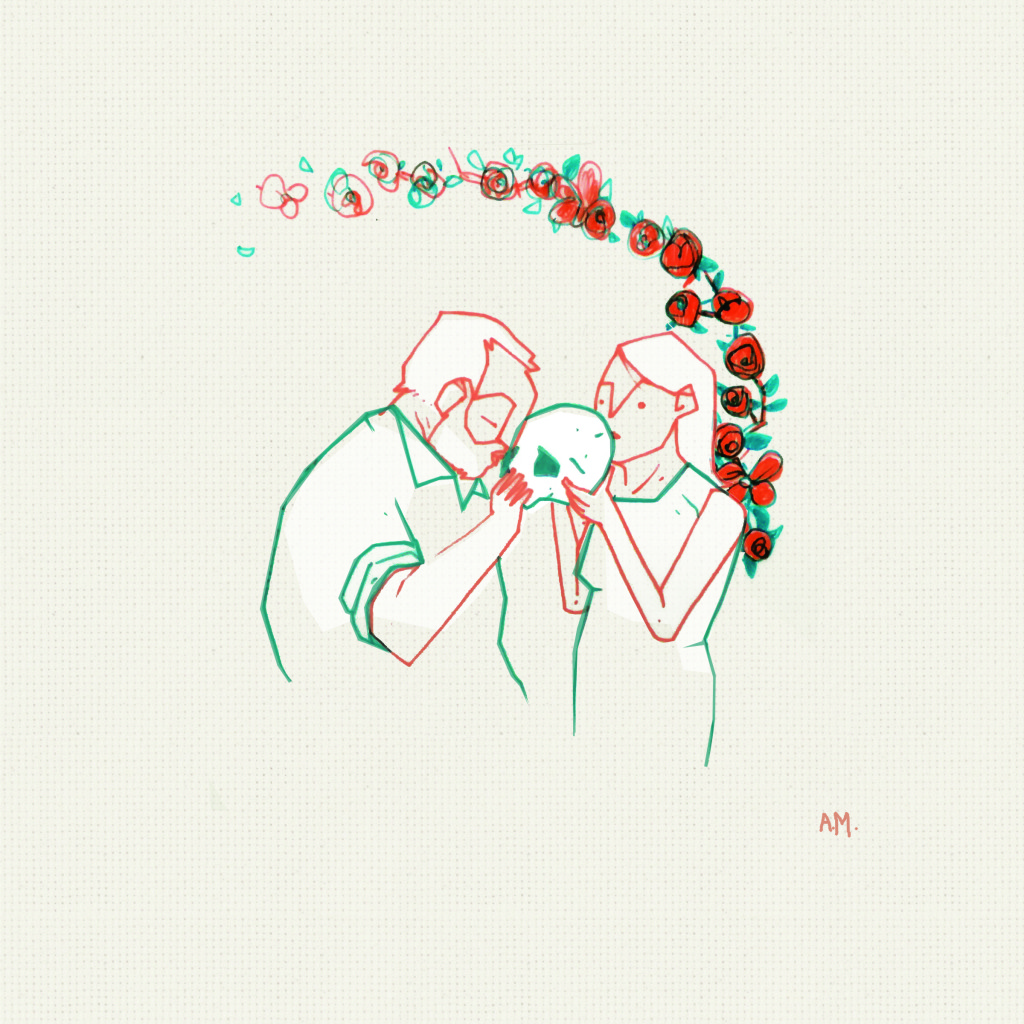It was my fault for asking. I was the one who asked the guy if he wore dreadlocks for spiritual reasons. I shouldn’t have done that, especially when I told you I’d meet you for coffee to talk about becoming a funeral director.
But I asked him anyway because you and I were talking about god or trying to find it and discussing how many different places we had looked. That is why I just assumed that guy would have said yes and given me a better lead into what I really wanted to tell you in the first place about working with the dead: I don’t know much more than you do. I do know that where you are coming from, given your past addiction and current recovery, you might find some of the emotional demands of working with the dead to be right in line with your skill set. The sadness and anger, the crushed expectations in your life and relationships and reconciling your part in all of it. The truth telling, the apologizing.
But the guy and his dreadlocks weren’t much help. They were a type of spiritual choice, he said, but not as cleanly linked to the Rastafari movement as I would have liked. It was cool that he offered his tips on using his—let’s be honest—Polish plait as a travel pillow, but I was really hoping he’d say something more along the lines of his massive tangle symbolizing patience and celebrating dirt. He did have a great line about divinity being a cruel joke you play on someone when I asked if he believed Haile Selassie was Jah. He understood Selassie’s rejection of the title.
You have to be open to believing anything. That’s really where I wanted to begin talking to you about how to get a grip on handling bodies. You have to think about it like this: you are going to want to fantasize. Everybody does. We all think it helps to imagine we are taking responsibility for something few people can manage. When Selassie was the emperor of Ethiopia and the Rastas in Jamaica believed he was Christ incarnate, he went on record denying he emanated from a deity. He kept his compassion for their beliefs, but he also maintained his mortality. It’s rare when our own beliefs offer such a stark rebuttal. It creates the illusion of control.
If you spend enough time doing the wrong thing, doing just one thing right feels like a kind of grace. I was letting people believe they were incapable of handling the dead. I mean, dead bodies are fine, they are normal and we need to help people understand this. Yes, even the bad ones—that is what I wanted to tell you.
There was this family I worked with at the cemetery whose son died by drowning in a lake in Colorado. It took about a week to have the burial. I know that before they had his burial, they flew him back to Texas and had a viewing of his body. They saw him. He might have been bloated, I don’t know. He may have had skin slip, too. I’m sure it was excruciating, but they chose to look at him anyway. They touched him, wrapped him in a shroud. Ellen, my boss, owns the land where they buried him. She told me that she helped his mother make the shroud he was covered in. The fabric was red, gold and green, the colors of Jamaica. I remember reading his obituary at the burial and they had a Bob Marley quote next to a picture of him wearing blond dreads.
I know you wanted to talk about the actual bodywork, like the embalming and restorative practices and whatnot. I know I told you I was over it and I should explain that statement. Just like they tell you in the program, the cravings go away once you stop using chemicals to fix your fears. I know you have a good understanding of the vascular system and this job would make good use of that knowledge. But I cannot stress enough how little that has to do with the actual job of interpreting what dead bodies represent to the living. You can’t be afraid to accept spiritually what you would otherwise be quick to reject.
You have to take the fulsome biographies of the dead at their word and respect them always. Death will always make the positive outweigh the negative. It explodes the parts we want to stay alive so badly and makes the pieces fall onto everything around us.
Achieving this type of empathy makes it hard to know what is right. Especially when actual business is involved. That’s the other real drag about working with the dead. You have to get paid; otherwise everyone with a passing interest would do it. It’s great that you’re learning how to be conscious of your intentions, it will keep you from saying you aren’t doing it for the money. I don’t get paid much now, but that’s my choice—my own type of sacrifice for the belief that wanting to do the work is better than feeling secure all the time.
People find it hard to see death without any rules. I understand the appeal of structure, the finality of death almost requires that there be a Right Way. But there are as many kinds of death as there are people. I suggest not holding one experience above another, which is difficult if you’re unsure of your own role in it.
It’s like when Ellen told me about Jerry, the father whose son drowned in Colorado. Ellen was really terrified of Jerry. In his deep pain, he told Ellen he didn’t want anyone else buried near his son’s grave after he saw that she was planning another burial close by. He wanted to buy more space near his son but hadn’t made any solid plans. Ellen didn’t think she could handle selling him anything in that state. She couldn’t see it from his perspective. She didn’t understand how he had expected her not to sell the unsold plots to other people out of respect.
It’s all about learning to take action, just like the program teaches you. I told Ellen I would work with him on a space and price agreement. I don’t know what you think about the world or how you feel about working for an owner. I know you’re thinking about it right now, otherwise we wouldn’t be here. I know that Jerry’s son thought about working for himself, too. Jerry and I talked about that as we looked over the maps of his grave. Ellen made the maps, but I took the credit.
Jerry walked around the area, studying the map, asking me over and over about the flags we had placed in the earth in comparison to the lines we had drawn. I sat on the bench near his son’s grave.
I asked what his son had been doing in Colorado.
Jerry smiled. He said he would just kind of work until he had a little money to do what he really wanted, like snowboard and water ski and hike.
I said he liked adventure.
Jerry said he didn’t like to be too pinned down.
I said those are the kind of people who remind us what life is really all about.
Jerry said he was a great kid.
At one point he asked if Ellen and I were kin. I said we weren’t, but at the same time that I was looking for a place to help families like his, she needed help doing it. He said it was meant to be.
Like kismet, I guess. But that is not something you say in front of someone who has received devastating news. It is something you say behind his back when looking at the circumstances, especially if they appear in your favor. I worked really hard not to appear false in front of Jerry. I had prepared for our meeting by watching skeptics and believers debate the divinity of Selassie, walking around the space where Jerry’s son was buried to imprint each rock and root in my brain, trying to convince myself I wasn’t afraid to give him what he wanted. In the end all I did was prove that it was possible for a person to know the truth and be willing to be wrong as well. We do this for our gods and our children. We get good at burying our intentions and make room for more.




